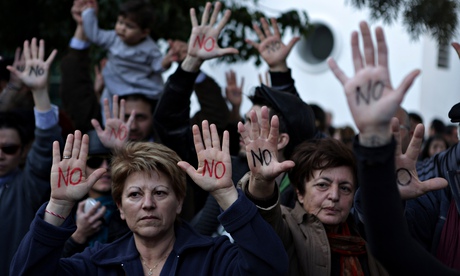Bad Banks: Greed, Incompetence and the Next Global Crisis review – a rogues' gallery of financial scandal
Alex Brummer's demolition job on the scandals of the last 10 years is a work of controlled menace


Just say no: Cypriots protesting against an EU bailout deal outside parliament, Nicosia, March 2013. Photograph: Patrick Baz/AFP/Getty Images
Just under a decade ago I found myself in common cause with an unlikely ally. The middle of the 2000s marked the second coming of the "loadsamoney" culture that had first reared its head when Margaret Thatcher set the markets free in the 1980s. The big bang was by 2007-08 to lead to the spectacular big bust. But on its eve nobody seemed too bothered: except two print titles, the New Statesman (which I was editing) and the Daily Mail. The paper that liberal Britain loves to hate was the first to get hot under the collar about the banks and their bonuses. Week after week it would fulminate against the spivs and the crooks who were gambling recklessly on individual and corporate debt. Week after week I found that my magazine was in agreement. And so I hired as a columnist the Mail's city editor, Alex Brummer, and the meeting of minds was complete.
I have long since departed that scene, but Brummer continues faithfully to ply his trade at the Mail. He has turned his reporting of the rogues' gallery into a book, Bad Banks, and has produced a superlatively dispiriting work. Like a surgeon at his operating table, Brummer dissects each British, American and European scandal of the last 10 years. He spares nobody, but his demolition job is made all the more powerful by the sparing language he deploys towards his targets. This is controlled menace at its best.
The author works backwards, starting with the most colourful and recent target of his paper's stable, the Rev Paul Flowers, chairman of the ethical bank, the Co-op, aka the Crystal Methodist. Only last November, the Mail on Sunday exposed Flowers for his drugs and sex habits. That humiliation laid bare the extent of the complacency and obduracy at the heart of Co-op governance. We had all come to believe that Wall Street and the City might lack a moral compass, but not the Co-op, surely? Brummer concedes that in terms of scale, the scandal was minor compared with the bill of £18bn for wrongful selling of insurance by all the high-street banks, the money-laundering fiasco at HSBC, and Libor rigging by Barclays. But he adds: "The elements that make up the scandal are worryingly reminiscent of other banking disasters in recent years, and demonstrate that in this sector at least history had – and still has – a habit of repeating itself."
Brummer provides a tour d'horizon of malpractice. The higher the reputation, the further is the fall. The author homes in on JP Morgan Chase, "a patrician bank with an enviable record", and its chairman and chief executive Jamie Dimon. Few bankers were more revered; Dimon visited the Obama White House 16 times. Whenever he appeared on Wall Street's favourite cable channel, CNBC, they rolled out the "Money Honey"correct, anchor Maria Bartiromo, whose job it was "to provide the suitably unchallenging questions". Dimon hated being challenged, not least over the billions the bank lost in a scam dubbed the London Whale. The deeper the bank was mired in scandal, the higher his pay rose, reaching a staggering $20m for 2013. Note the year: this was not before the global financial crisis. His package was awarded, as many others in the US and UK have been, long after governments declared that "lessons had been learned" and supervision had been tightened.
Continental Europe was just as bad. The supposedly upright Dutch were forced to inject almost €65bn to rescue the industry, including bailing out insurers ING and Aegon and nationalising what remained of ABN Amro after its disastrous merger with RBS. The statist French took to the freewheeling antics of the City of London with considerable aplomb, as Brummer explains with pen portraits of some of its cavalier bankers.
In July 2012, in the same month that Barclays and its famously combative boss, Bob Diamond, became embroiled in the Libor rate-fixing scandal, the US Senate's subcommittee on investigations issued an excoriating report on HSBC. It accused the bank of being a conduit for "drug kingpins and rogue nations" in Mexico, Saudi Arabia, Iran and others, from 2001 to 2009. For eight years, in spite of board meetings, annual general meetings, HR departments and other mechanisms for corporate governance, the bank was involved in brazen criminal activity.
It was not just the investment side of the banks' operations – the so-called casino part of the banks – that were up to no good. The "customer-friendly", good old retail divisions were not averse to dodgy dealings. Between 2006 and 2011, 16m payment protection insurance policies were sold, most of them mis-sold, in other words fobbed off at a high premium to unsuspecting customers, and rarely to be recouped. In 2012, banks desperate to salvage their reputations were sending out up to 10,000 compensation cheques a day.
The great strength in this book lies in the detail. Indeed, so deeply involved does Brummer become in the minutiae of scandals, it is sometimes hard for the lay reader to disentangle one from the other, and to make sense of the bigger picture. The author does bring it all together in the conclusion, making clear, as the subtitle of the book attests, that repetition is inevitable. It is just a matter of time. Governments have tinkered with regulation; they have rapped various individuals over the knuckles, but they remain as supine in the face of the financial services sector as they have ever been. Only in Ireland and Iceland have individuals actually been jailed. Most of the bankers who oversaw wrongdoing remain in situ and continue to be rewarded handsomely for their efforts.
Brummer gives the last word to Justin Welby. Invoking the Archbishop of Canterbury might, at first glance, seem curious, but Welby spent 11 years as an oil executive and served on a parliamentary commission on banking. He notes he has heard nothing to convince him that the bankers were contrite, that the institutions they served had truly changed their nature, or that there had been a revolution in banking practice. He then muses: "At the heart of good banks have to be good people." Given everything that has happened; given the ease with which billions of dollars can be transferred around the world at the flick of a mouse, the idea of leaving moral rectitude to the individual's conscience seems just a touch naive.
John Kampfner's new book, The Rich, a 2000-year History, is published by Little Brown in October.
The author works backwards, starting with the most colourful and recent target of his paper's stable, the Rev Paul Flowers, chairman of the ethical bank, the Co-op, aka the Crystal Methodist. Only last November, the Mail on Sunday exposed Flowers for his drugs and sex habits. That humiliation laid bare the extent of the complacency and obduracy at the heart of Co-op governance. We had all come to believe that Wall Street and the City might lack a moral compass, but not the Co-op, surely? Brummer concedes that in terms of scale, the scandal was minor compared with the bill of £18bn for wrongful selling of insurance by all the high-street banks, the money-laundering fiasco at HSBC, and Libor rigging by Barclays. But he adds: "The elements that make up the scandal are worryingly reminiscent of other banking disasters in recent years, and demonstrate that in this sector at least history had – and still has – a habit of repeating itself."
Brummer provides a tour d'horizon of malpractice. The higher the reputation, the further is the fall. The author homes in on JP Morgan Chase, "a patrician bank with an enviable record", and its chairman and chief executive Jamie Dimon. Few bankers were more revered; Dimon visited the Obama White House 16 times. Whenever he appeared on Wall Street's favourite cable channel, CNBC, they rolled out the "Money Honey"correct, anchor Maria Bartiromo, whose job it was "to provide the suitably unchallenging questions". Dimon hated being challenged, not least over the billions the bank lost in a scam dubbed the London Whale. The deeper the bank was mired in scandal, the higher his pay rose, reaching a staggering $20m for 2013. Note the year: this was not before the global financial crisis. His package was awarded, as many others in the US and UK have been, long after governments declared that "lessons had been learned" and supervision had been tightened.
Continental Europe was just as bad. The supposedly upright Dutch were forced to inject almost €65bn to rescue the industry, including bailing out insurers ING and Aegon and nationalising what remained of ABN Amro after its disastrous merger with RBS. The statist French took to the freewheeling antics of the City of London with considerable aplomb, as Brummer explains with pen portraits of some of its cavalier bankers.
In July 2012, in the same month that Barclays and its famously combative boss, Bob Diamond, became embroiled in the Libor rate-fixing scandal, the US Senate's subcommittee on investigations issued an excoriating report on HSBC. It accused the bank of being a conduit for "drug kingpins and rogue nations" in Mexico, Saudi Arabia, Iran and others, from 2001 to 2009. For eight years, in spite of board meetings, annual general meetings, HR departments and other mechanisms for corporate governance, the bank was involved in brazen criminal activity.
It was not just the investment side of the banks' operations – the so-called casino part of the banks – that were up to no good. The "customer-friendly", good old retail divisions were not averse to dodgy dealings. Between 2006 and 2011, 16m payment protection insurance policies were sold, most of them mis-sold, in other words fobbed off at a high premium to unsuspecting customers, and rarely to be recouped. In 2012, banks desperate to salvage their reputations were sending out up to 10,000 compensation cheques a day.
The great strength in this book lies in the detail. Indeed, so deeply involved does Brummer become in the minutiae of scandals, it is sometimes hard for the lay reader to disentangle one from the other, and to make sense of the bigger picture. The author does bring it all together in the conclusion, making clear, as the subtitle of the book attests, that repetition is inevitable. It is just a matter of time. Governments have tinkered with regulation; they have rapped various individuals over the knuckles, but they remain as supine in the face of the financial services sector as they have ever been. Only in Ireland and Iceland have individuals actually been jailed. Most of the bankers who oversaw wrongdoing remain in situ and continue to be rewarded handsomely for their efforts.
Brummer gives the last word to Justin Welby. Invoking the Archbishop of Canterbury might, at first glance, seem curious, but Welby spent 11 years as an oil executive and served on a parliamentary commission on banking. He notes he has heard nothing to convince him that the bankers were contrite, that the institutions they served had truly changed their nature, or that there had been a revolution in banking practice. He then muses: "At the heart of good banks have to be good people." Given everything that has happened; given the ease with which billions of dollars can be transferred around the world at the flick of a mouse, the idea of leaving moral rectitude to the individual's conscience seems just a touch naive.
John Kampfner's new book, The Rich, a 2000-year History, is published by Little Brown in October.
No comments:
Post a Comment